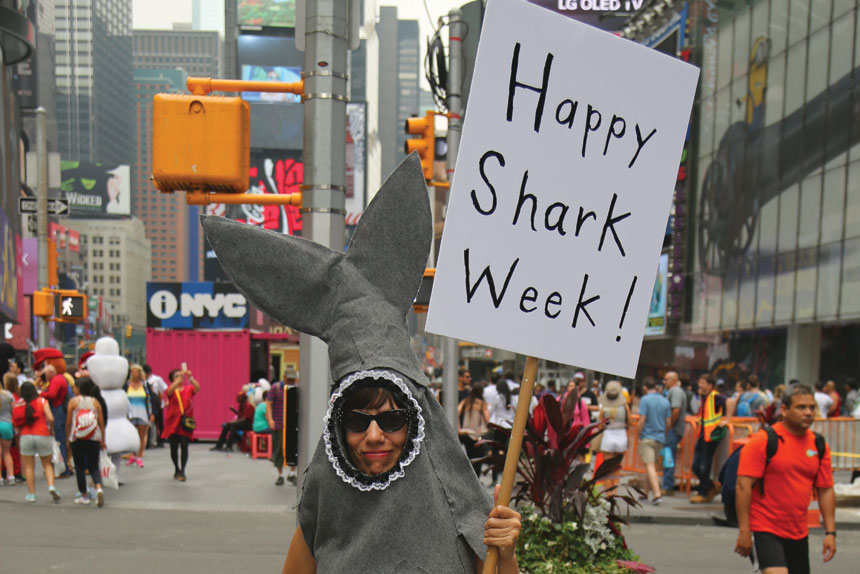Of the six gloriously preposterous Sharknado movies, the one most fittingly titled was Sharknado 3: Oh Hell No! Absolutely perfect. There’s an inherent grin in that title — and also bite. Hell, yes.
Like nearly everything in the realm of shark entertainment, the Sharknado films — carefully timed for summer release between 2013 and 2018 — were intended to elicit groans. And, too, to scare the popcorn out of us. There is something about these sleek, toothy fish that triggers terror. But it is not entirely justified.
Facts: Despite their reputation, sharks aren’t the threat they’re made out to be in the media. Typically, there are only about 50 shark attacks (or, as some scientists would suggest, “bites”) worldwide every year; on average, four are fatal. Due largely to commercial overfishing, several species, including the great white, are now endangered. And yet we often read that the oceans are “infested” with sharks. Why not say that, in certain waters, they remain “abundant”? Whoever handles sharks’ PR needs to be fired.
Lots of folks believe you can trace our profound fear of sharks to Steven Spielberg’s 1975 blockbuster film, Jaws. That sounds right. The mania continues essentially unabated to this day. Recently, one of my local dailies featured a headline that announced “Sharks Bite 16 People Off Florida in 2022.” Okay — but it’s notable that the story was splashed provocatively across the top of Page One that morning, clearly intended to rattle readers.
As it happens, one of the peculiarities of the human species is that apparently, if counter-intuitively, many of us are wired to enjoy being terrified. It is entirely in keeping with nature, then, that the Discovery Channel every year delivers Shark Week, a splashy TV pageant that since its inception in 1988 has practically grown into a rite of American summers. (This year it begins July 11.)
Discovery drops its chum and viewers in huge numbers invariably chomp in a sort of feeding frenzy. Last year, 21 million people tuned in to what was quite a buffet of shark programming: documentaries, docu-fiction, feature films, high-concept specials, and so on. (Actual samples from the past: Alien Shark, Sharkpocalypse, Naked and Afraid of Sharks.) It’s grabby stuff, which is why Discovery is hooked on the guaranteed ratings boost. (“Live Every Week Like It’s Shark Week,” the channel urges in its promo materials.)
Shark Week has blossomed into so much a part of our culture that it’s regularly referenced by congresspeople, governors, actors, and others in the public sphere. Not long ago it came up in a conversation with porn film actress Stormy Daniels during a 60 Minutes segment. Seriously.
In the eyes of Shark Week’s critics — and they are plentiful — that’s part of the problem. These days, they say, the shows are less focused on exploring real science than they are on promoting goofy entertainment. They complain, for instance, that the use of celebrity participants like Dwayne “The Rock” Johnson, Craig Ferguson, and William Shatner serves only to trivialize the subject matter. Where are the bona fide scientists? Where are the women experts?
Calling Shark Week a “missed opportunity,” a team of scientists two years ago issued a report that concluded men were way overrepresented on the programs. Additionally, their study found “staggering examples of needlessly promoting fear.” Discovery answered that it is now working more closely with key oceanographic agencies.
Given that, there’s good reason to believe the Shark Week — the longest-running series on cable TV — is assured a much extended life. In that respect, the sharks of summer seem safe.
In the May/June issue, Cable wrote about the memoir boom.
This article is featured in the July/August 2023 issue of The Saturday Evening Post. Subscribe to the magazine for more art, inspiring stories, fiction, humor, and features from our archives.
Become a Saturday Evening Post member and enjoy unlimited access. Subscribe now



